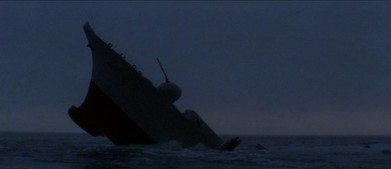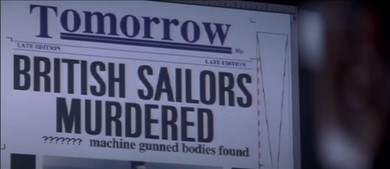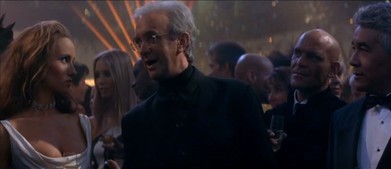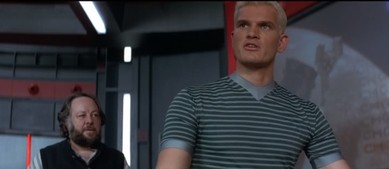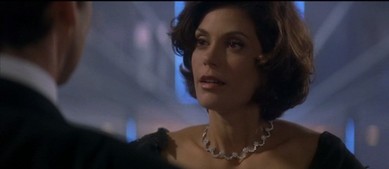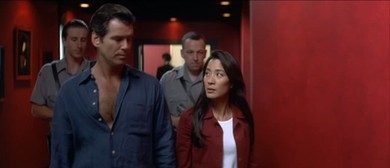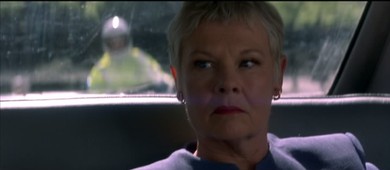Bond Girl: Re-Watching and Re-Evaluating Tomorrow Never Dies
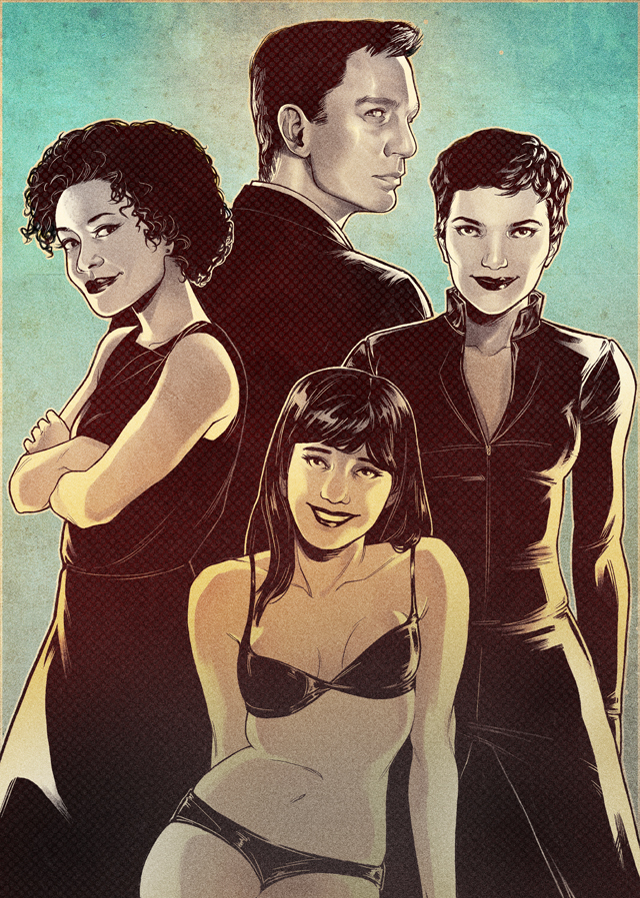
Original illustration by Emilie Majarian for The Mary Sue.
Welcome to Bond Girl, a series where we’ll be re-watching and re-evaluating every James Bond film until Spectre’s release.
Tomorrow Never Dies somehow manages to be even more representative of the nineties than GoldenEye. Its focus on a media mogul’s plan to start a war in order to gain global media coverage is something that could only have been thought of for the first time during that period of time.
The eighteenth of Eon Productions’ James Bond films, Tomorrow Never Dies revolves around lies, manipulation, and one man’s quest to control the flow of media around the world by starting World War III. This is Pierce Brosnan’s second film as James Bond and one of his best. Seriously, the only reason that this film wasn’t number one at the box office was because Titanic came out the same day.
Somehow, not even Bond could sink the Titanic.
Like Titanic, much of the plot of Tomorrow Never Dies revolves around a sinking ship.
British frigate HMS Devonshire winds up off course in Chinese-held waters instead of international waters. With Elliot Carver, head of the Carver Media Group Network, watching and waiting while his henchmen do his dirty work for him, one of his henchmen (American “techno-terrorist” Henry Gupta) uses a stolen GPS encoder to confuse their ship. Of course, Carver has a plan and that plan is to use his “stealth ship” to make it appear that a Chinese jet is responsible for both the attack and the outright murders of the ship’s survivors.
The goal of this game is to sow confusion and as the HMS Devonshire sinks into the water of the South China Sea, Carver is busy making up his headline for that day’s newspaper. He doesn’t care about the lives he’s lost or the people he’s just killed.
All that matters is selling more papers, bringing in a wider audience, and of course, solidifying his hold as a media baron. Carver has his fingers in all the pies and the film more than implies that he’s been manufacturing the news more than he’s been reporting it. That’s part of what brings him to MI6’s attention. Carver couldn’t even control himself enough to leave out details of the attack that a civilian newsgroup wouldn’t know.
Elliot Carver is just this smarmy mess of a man. The film goes the ableist route and calls him psychopathic but obviously, that’s not what he is. Carver is extremely and obvious narcissistic. His goals all center in gaining power, prestige, and presence even at the cost of someone else. The only reputations that matter are his own and that of his media group. The only life that matters is his own.
Self-centered, there’s nothing about Carver that makes you empathize with his vision. He’s not a villain due to trauma or to due to a lack of privilege. He’s just like this because he can be. He’s so difficult to empathize with and only Jonathan Pryce’s acting saves him from being a boring villain. Carver’s fascination with media, with his media, can be repetitive. It doesn’t make sense.
There’s no real reason for Carver to do any of what he’s doing.
Carver already has his hooks in the media with a reach that extends nearly worldwide. He has blackmail material over other people in power. He has a massive control over the market and different parts of his company invested in different media ventures all over the world.
So why does he want to start World War III?
So that his media company can be the first to broadcast it and so that he can gain exclusive access to China with his company.
Seriously, the man is blackmailing the president of the United States and he still thinks he needs more power than that? It’s ridiculous, but then we’re shown that Carver really doesn’t care about anything that doesn’t help or hinder him. Carver has this fantasy about being universal, about reaching as many people as he can, but of course, he doesn’t think to do it any other way than with violence, murder, and manipulation.
James Bond: I never believe what I read in the press anyway.
Carver: Therein lies your problem, Mr. Bond. You see, we’re both men of action, but your era and Miss Lin’s is passing. Words are the new weapons, satellites the new artillery.
Bond: And you become the new Supreme Allied Commander?
Carver: Exactly! Caesar had his legions, Napoleon had his armies, I have my divisions. TV, news, magazines. And by midnight I’ll have reached and influenced more people than anyone in the history of this planet, [points up] save God Himself. And the best He ever managed was the Sermon on the Mount.
Look at the ego on this guy! Look at everyone he’s comparing himself to. Dictators and a god. Okay. Sure. That’s not completely off-putting … I’m still trying to figure out whether or not Carver thinks that he’s doing something wrong or if he’s just managed to handwave his behavior away as a necessary evil.
The narrative lends to him being hyper-obsessed with the news but where they could’ve spun him as a character obsessed with the truth of the news, he’s focused on the lying side. I think that’s interesting because he’s comparing himself to notable historical figures and trying to boost his influence around the world but at the same time he’s still just so smarmy. I don’t read him as charming. I don’t see him gaining his influence in a lawful way.
He’s just gone above and beyond to secure the stability of his “brand”. While I don’t hate him as much as I hate hm … all the henchmen in Licence to Kill, but he’s actually super annoying to me throughout the film. His death, when it comes at the whirring blades of his very own sea drill, is incredibly satisfying (albeit a little gross for all that it’s shown offscreen).
Now, most of Carver’s henchmen are easily forgotten, but I just want to mention two of the ones that were actually weren’t. Played by Götz Otto, Richard Stamper is kind of a mix between Red Grant (From Russia With Love) and Xenia Onatopp (GoldenEye) when it comes to villainous archetypes in the franchise.
He’s a brute of a character and like Grant, he’s able to fling Bond around without much of an effort. Like Xenia, his pain receptors are all wonky so what should hurt him only reads as pleasure or pisses him off. This usage of weird biology is actually a recurring one when it comes to villains because we get it in GoldenEye, in this film, and next in The World Is Not Enough. It makes little to no sense but I mean, it certainly makes for hardy villains considering that we see Stamper wandering around with a knife wound in one leg from earlier on in the film and he doesn’t seem to care.
Now, Stamper’s death wasn’t as satisfying as some of the other henchman deaths in the film. It had to happen and there was absolutely no way for him to end up switching to a life of good after everything he’s done in this film. He’s not a forgettable villain but at the same time, I didn’t feel that much for him either way.
The other henchman I want to talk about is Dr. Kaufman, Stamper’s mentor and father figure. He happens to be a renowned assassin and professor who practices torture as a hobby. I’m not that much of a fan of torture in my movies and the fact that it’s very strongly implied that he used some of his skills on Paris Carver before he killed her only makes me detest him more. Now his death (killed by his own gun as he begged for his life) was satisfying.
I’ve decided to embrace the fact that I absolutely enjoy when Bond gets revenge on people. It’s satisfying because even though we’re not fighting alongside the character, we’re empathizing with him and so his losses become our losses for the moment. Especially when we’re dealing with characters that abuse or kill women, I wind up waiting for their deaths because it’s close to the only way that I can be okay with the film after that.
It’s a bit bloodthirsty but hey, it’s what gets me through so many movies these days.
In Tomorrow Never Dies, we get two Bond Girls. We get Teri Hatcher as the ill-fated Paris Carver and Michelle Yeoh as the
Since we’ve talked about Paris Carver’s death, let’s talk about her as a character.
I love Teri Hatcher. The Adventures of Lois & Clark is my favorite superhero television show in the history of television shows and her Lois Lane was so close to perfect. If you tell me to think of my favorite Lois Lane, it’s going to be her. Despite the fact that the one thing I’ve never been able to forget about Tomorrow Never Dies is how Hatcher’s Paris Carver dies, I still really enjoy her in this role.
I like Paris Carver because she’s seriously just like the character Hatcher is famous for. She’s a snarky woman with secrets and a past that she doesn’t often talk about. While she isn’t necessarily seen as a strong female character (due to her relationship with Carver and how she keeps going back to him), I’d have to argue that she really is strong even if it’s not in a physical way.
Much of her relationships with Bond and with Carver are shown off screen. We come to her at the end of both of those relationships although she doesn’t know that her rekindled relationship with Bond will lead to her death on Carver’s orders. We get more uncomfortable implications here, that Paris isn’t comfortable with Caver and that she doesn’t trust him. That he might hurt her.
She knows that there’s something wrong with Carver, but she doesn’t take the out. She leaves Bond for him, exercising her power one last time because she thinks that it’s the only thing that she can do to keep herself and Bond safe. So she returns to this man that treats her like a trophy instead of a person and winds up dying so that he can tie up loose ends.
(And since she’s killed partly so that Carver can throw James Bond off of his game, I’m saying that this definitely falls under fridging. I don’t think it’s as terrible as other instances of fridging in the franchise but it’s still you know… terrible.)
Thankfully, we get Michelle Yeoh’s Colonel Wai Lin as the film’s official Bond Girl and the character that stole the entire film for me. Instead of me only being incredibly bummed out by Teri Hatcher dying barely a third of the way into the film, I got to swoon over Wai Lin. Widely seen as one of the best Bond Girls in the series, Wai Lin is known for being a very tough, very persistent character. She’s gorgeous because that’s practically law as far as Bond Girls are concerned but the narrative doesn’t continuously remind us that she’s beautiful.
Instead, what the narrative does is remind us that Wai Lin is basically even more of an amazing badass than James Bond is. She’s his equal and in some ways, she’s a better agent than he is. Part of what’s great about Wai Lin is that she’s this strong character but she’s not tugged one way or another in terms of stereotyping. One issue that this franchise has had especially with Asian women is hypersexualizing them. Remember You Only Live Twice?
Yeah.
I’m still wishing that I could forget about it. Where that film raised fetishization to newer and more uncomfortable levels with its portrayal of both Chinese and Japanese women, Tomorrow Never Dies does things right. Wai Lin isn’t sanitized for Western consumption. She’s a Chinese agent and relatively open about it. She’s a fighter but they don’t soften her edges. And of course, the film’s writer and director manage to get this balance where Wai Lin is this nuanced character.
She’s not an erotic exotic, existing only to make the audience uncomfortable or aroused because the crew thought only in stereotypes. At the same time though, she isn’t desexualized either. Both of those things are huge problems because usually, if women of color aren’t hypersexualized in media, they’re desexualized and taken completely out of the running as romantic partners.
Wai Lin doesn’t get that treatment.
She’s balanced in the film where she’s able to kick butt and take names, but she’s also shown as a real person. She’s sexy but not sexualized. Bond is scene in more compromising positions than she is. Aside from two or three parts in the film, she’s wearing mission clothing but even when she’s not fully dressed (such as in the shower scene in Ho Chi Minh City), the focus doesn’t feel excessive.
And that’s a good thing considering how terrible some of these films have been when it came to the male gaze and female bodies.
Lastly, I want to talk briefly about Bond’s support staff and my love of M’s everything.
In this film, M still isn’t soft. How can she be when she has to deal with politics and infighting and Admiral Roebuck refusing to listen to her? I really do wish that we got more of M’s backstory outside of Skyfall‘s confusing additions to canon where she was concerned because it’s killing me not to know more about her and her rise to power.
All I can figure is that it must have been recent because M gets absolutely no respect. Admiral Roebuck dismisses her opinions, willfully putting Bond into danger despite her telling him that she has faith in her man. He talks over her, takes over her operation, and is generally a pain in the rear even though he’s consistently and constantly dead wrong.
And M handles it the way that she does everything else, with a sneer, some snark, and (I’m assuming) the desire to reach for her pistol and do some damage. Judi Dench is my favorite elderly actress and it’s entirely due to her role as M. She takes the role that Bernard Lee originated and sharpens it. Her M is hard on Bond because she knows he can do better, but she isn’t over the top about it. She doesn’t take any sass from anyone and her wit is extremely cutting.
Overall, Tomorrow Never Dies is a very good film. I mean, it kind of has to be considering how it’s one of the few Bond films to contain the fridging of a female character that didn’t leave me raging for hours afterward. The characters on the side of good are interesting and fun to watch. Pierce Brosnan continues to kill as Bond, blending the traditional charm and skill at fighting with a sensitivity that doesn’t seem faked.
What I’m looking forward to:
In The World Is Not Enough we get a fantastic femme fatale in the form of Elektra King. Elektra is a subtly different type of female villain. She plays on Bond’s emotions and on his sexuality, using his feelings for her to manipulate him and mess with his head. She’s actually kind of a scary villain because where most villains use women as the bait in these films, Elektra has turned herself into the bait for Bond but she’s no victim. It’s just fascinating because she really messes with your image of what Bond villains are supposed to be like.
Stitch writes about comics, nerd history, and ridiculous romance novels when not working frantically on her first collection of short stories. Find her on her blog or on Twitter.
—Please make note of The Mary Sue’s general comment policy.—
Do you follow The Mary Sue on Twitter, Facebook, Tumblr, Pinterest, & Google +?
Have a tip we should know? [email protected]
